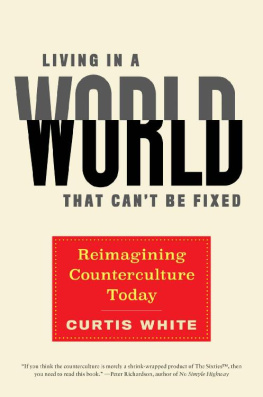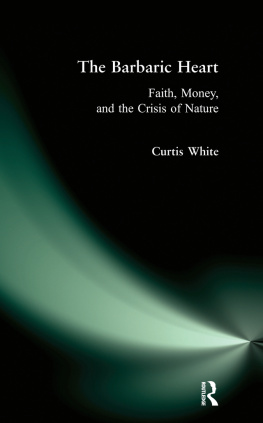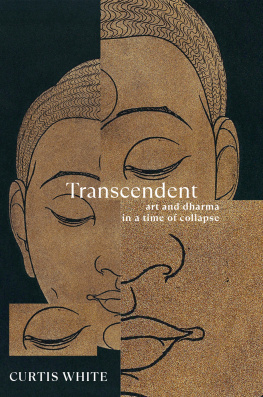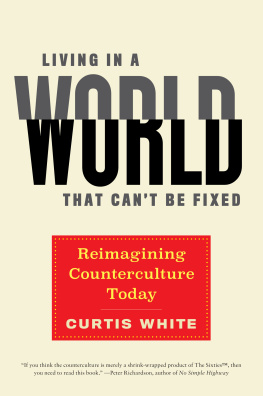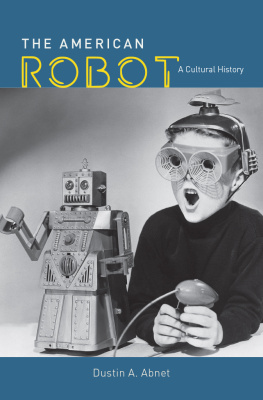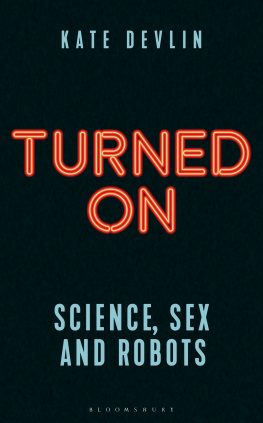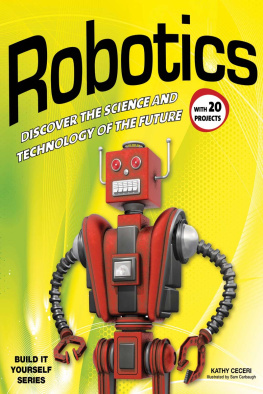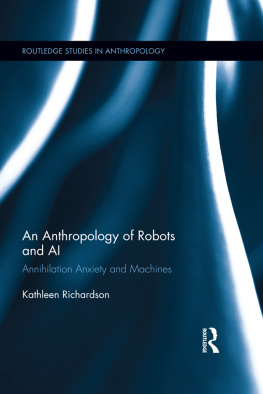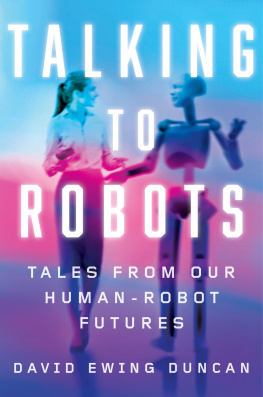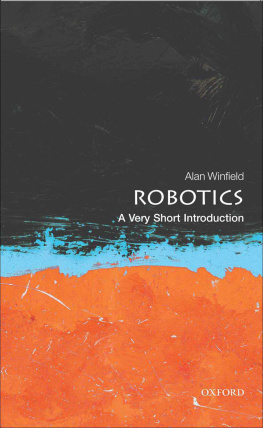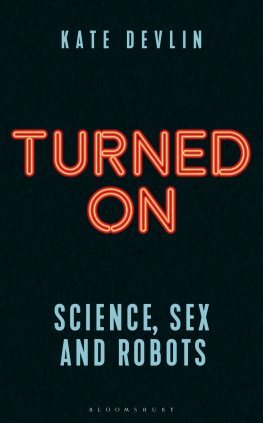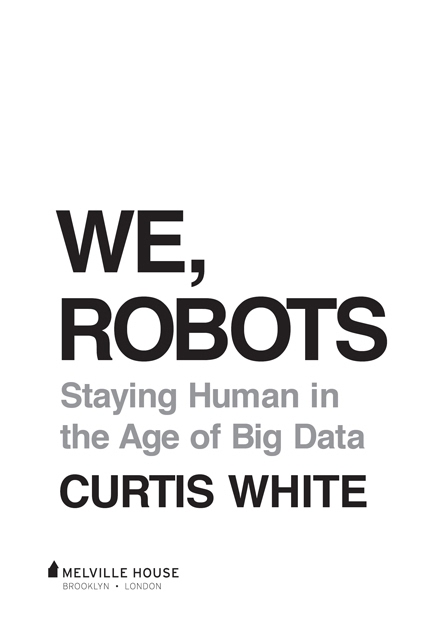WE, ROBOTS
Copyright 2015 by Curtis White
First Melville House Printing: October 2015
Portions of this book have appeared in Playboy, Laphams Quarterly, Tricycle, Jacobin, The Village Voice, and The Big Other.
Melville House Publishing
46 John Street
Brooklyn, NY 11201
and
8 Blackstock Mews
Islington
London N4 2BT
mhpbooks.com facebook.com/mhpbooks @melvillehouse
Library of Congress Cataloging-in-Publication Data
White, Curtis, 1951 author.
We, robots : staying human in the age of big data / Curtis White.
pages cm
ISBN 978-1-61219-455-4 (hardback)
ISBN 978-1-61219-456-1 (ebook)
1. Human beings. 2. Philosophical anthropology. I. Title.
BD450.W493 2015
128dc23
2015032089
Designed by Marina Drukman
v3.1
There was a time when humanity faced the universe alone and without a friend. Now he has creatures to help him; stronger creatures than himself, more faithful, more useful, and absolutely devoted to him. Mankind is no longer alone.
I SAAC A SIMOV , I, Robot
We must realize that modern civilization is thoroughly oriented towards dehumanizing humanity in every possible way; that is to say, we are fast turning into robots or statues with no human souls. Our task is to get humanized once more.
D. T. S UZUKI
CONTENTS
Introduction
THE PHILOSOPHY OF AS-IF
Man is a make-believe animalhe is never so truly himself as when he is acting a part.
W ILLIAM H AZLITT
Isnt it amazing how often a doctor will live up to our expectation of how a doctor should look?
My Dinner with Andre
When I was an undergraduate studying philosophy at the University of San Francisco in the late sixties, I discovered Hans Vaihinger and his Philosophy of As-If (originally The Theory of Scientific Fictions), developed between 1876 and 1911. The consciously false, Vaihinger wrote, plays an enormous part in science, in philosophies, and in life.
I wanted to give a complete enumeration of all the methods in which we operate intentionally with consciously false ideas It must be remembered that the purpose of the world of ideas as a whole is not the portrayal of realitythis would be an utterly impossible taskbut to provide us with an instrument for finding our way about more easily in this world.
For Vaihinger, our ideas are not a picture or copy of the actual world; they are used only to deal with an otherwise unknowable reality. We live in a parallel world of our own making far more than we live in reality. He liberally quotes Friedrich Nietzsche, who wrote in Human, All Too Human: The significance of language for the evolution of culture lies in this, that mankind set up in language a separate world beside the other world, a place it took to be so firmly set that, standing upon it, it could lift the rest of the world off its hinges and make itself master of it.
What was behind this parallel world of stories? For Vaihinger, the answer was science. Charles Darwin, for example, told a story about the origins of modern species that was broadly believed until very recently. He argued that all species are linked to their ancient ancestors in the same way that the branches of a tree are connected. Thus, the metaphor of the great Tree of Life, on which living species are all on the upper most limbs and the extinct ancestor species are farther down the trunk. For the branch homo sapiens, there is the descending branch of the Neanderthals, who evolved from the Asian homo erectus, who were begat by the ape-man Australopithecus. This story provided narrative stability for scientists (if not Christians) until the recent discovery of many more hominin strains complicated the matter. But for Vaihinger, even if stories like Darwins are false they still contribute to our species ability to adapt, thrive, and evolve. In other words, they are useful.
As Vaihinger wrote aphoristically, What we call truth is really only the most expedient form of error.
Vaihinger also observed something he called the law of the preponderance of the means over the end. At some point in our development, our stories began to take on a life of their own that came to seem even more important than the practical purposes they were originally intended to serve. It is this preponderance of means, and not mere survival, that makes life worth living, as we humans say. Darwin may have understood the struggle for life, but he had little to say about the quality of life. In the end, we dont want to survive under just any terms: we want meaning, richness, satisfaction, happiness, wisdom, all of it.
This preponderance has manifested itself in ways that are so familiar to us that we forget to marvel at how richly superfluous they are. Consider sex (as Im sure you have). Animals copulate and animals breed, but unlike the other beasts humans spend much of their lives seeking something they call romantic love. Some lovers are richly satisfied, or sated, or wounded, or homicidally enraged by the desires romantic longing produces. There is bliss, fistfights with rivals, rapture, and broken china. Some feel that by falling in love they have become whole for the first time while others claim they are permanently damaged (and sometimes both). There are unforgettable memories of a weekend in Capri (or the basement sofa when the parents were out), and there are those contrary days when an irate spouse has had the lock on the front door replaced and a court order issued barring the other from their home. Sexual reproduction may be the Darwinian theme, but it is like the banal melody by Diabelli that Beethoven turned into magical and infinite variations, some full of confident energy, some melancholy, and some both by turns.
As with the notorious French person who would never have fallen in love if she hadnt read about it first, our sex lives, as we say, are not something apart from what we find in art. For instance, in Marcel Prousts Swanns Way, Swann is in love with Odette but the only thing he really knows about her is that she reminds him of a painting and
And, revealingly, our thinking about the sex act itself is narrative: it has a ground situation (foreplay), rising action (if you will), crisis (that delicious just-before), climax (if you will), and denouement (what the French [for some reason] call the little death, petite mort), all of it delightfully whipped up in concupiscent curds, in Wallace Stevenss phrase. Even the human body itself seems an expression of the preponderance of means: were not just sex organs, not genitals, not just


